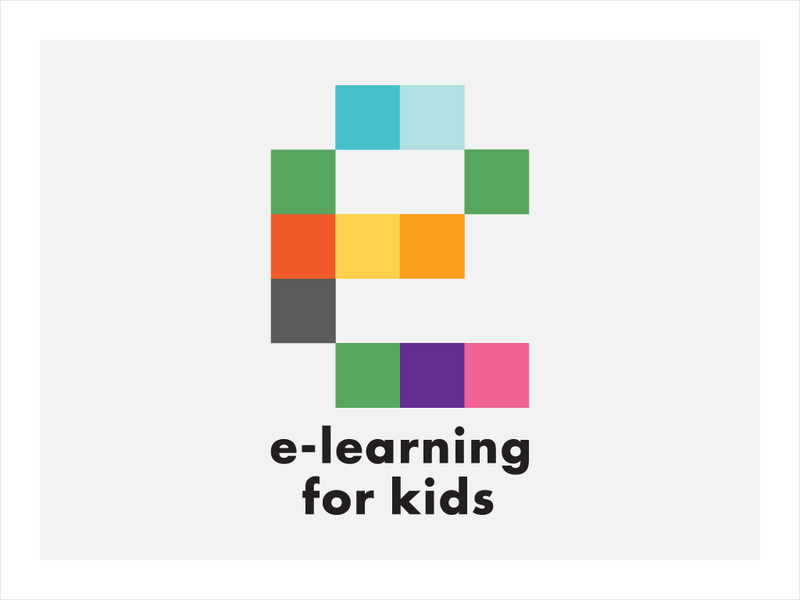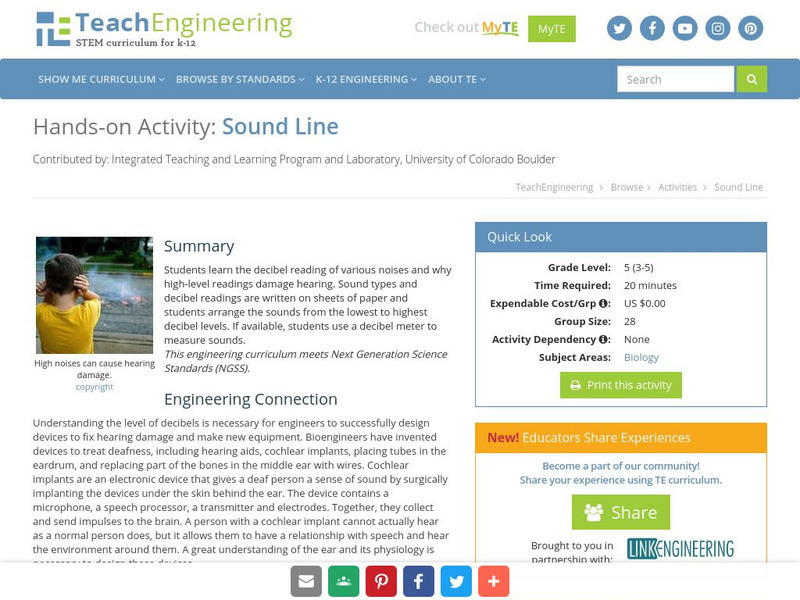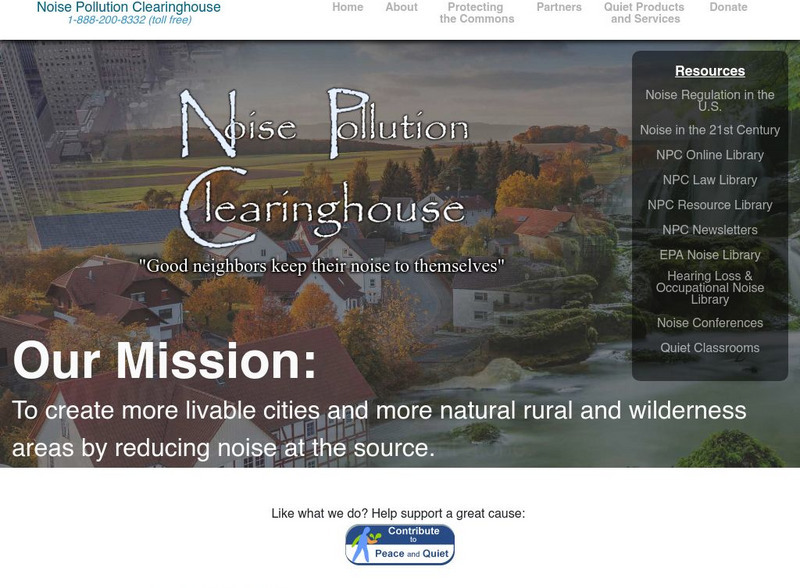Beacon Learning Center
Beacon Learning Center: Christmas Bear and His Five Senses
Come along with Eric as he teaches Christmas Bear how to use his five senses.
PBS
Pbs Teachers: Dog Ears
Test your auditory memory by matching sounds in this online interactive game. Decode audio clues to decipher the five passwords for Ruff's safe.
PBS
Pbs Teachers: Double Dutch
Discover how to jump double dutch, and watch kids perform different double dutch moves. See how kids use the scientific method to find out what has a bigger effect on jump rope performance - hearing or seeing.
Other
Physics and Psychophysics of Music
This site is filled with information pertaining to the physics of sound and music.
Other
Society for Neuroscience: Brain Facts [Pdf]
This is a publication on the human brain and how it works. Gives details on the neuron, how the senses interact with the brain and much more. PDF (requires Adobe Reader).
Curated OER
Kids Health: Hearing [Pdf]
We deal with loud noises in our environment all the time - some we can control and some we can't. Noise-induced hearing loss (NIHL) can be a problem for kids and teens, especially with the prevalence of earbuds and handheld devices that...
The Franklin Institute
Franklin Institute: Music to Our Ears
Discover the connection between sound waves and hearing with this webpage tutorial. Be sure to click on the picture for detailed information.
Frontiers Media
Frontiers: Seeing With Your Ears: A Wondrous Journey Across the Senses
For dozens of years it has been believed that the brain is organized into "sensory areas": that is, that there is a "visual area," an "auditory area," and so forth, and that the visual area can only process visual information. It has...
Other
Siemens Science Day: Life Science: Hear Ye! Hear Ye! [Pdf]
Through this hands-on science activity, students make a model of the human ear as well as explore the parts of the ear and their roles in transferring sound.
E-learning for Kids
E Learning for Kids: Science: Easter Island: Senses: Observation of Living Familiar Things
Students investigate how the senses are used to make observations about objects and things in the environment.
E-learning for Kids
E Learning for Kids: Science: Bikini Atoll: Senses: Observation of Familiar Materials and Objects
Students use their senses to identify and describe objects.
E-learning for Kids
E Learning for Kids: Science: Antarctica: Which Types of Sounds Do You Know?
For this lesson, students learn about the five senses, identify objects that make sound, and take a fun fact quiz at the end.
Reading Rockets
Reading Rockets: Phonics and Decoding
This resource provides information and techniques for teaching phonics and decoding, which assist with early literacy.
Curated OER
Kids Health: Model Eardrum
You can make a model of the eardrum by following the simple directions on this site. Only four common items are needed to create this model.
National Institutes of Health
Nidcd: Auditory Neuropathy
Through a series of topic related questions and answers, this site discusses and thoroughly analyzes the hearing disorder known as auditory neuropathy. Current trends in research are discussed along with the inclusion of a list of...
TeachEngineering
Teach Engineering: Sound Line
Students learn the decibel reading of various noises and why high-level readings damage hearing. Sound types and decibel readings are written on sheets of paper, and students arrange the sounds from the lowest to highest decibel levels....
Curated OER
Kids Health: Ears Quiz
A short quiz testing knowledge of the structure and function of human ears.
Curated OER
Kids Health: Ears
How do you hear? Watch this ear video and take the accompanying quiz to step inside the ear. [6:08]
Scholastic
Scholastic Instructor: Science of Sound
This resource is for teachers who are looking for information, activities, experiments, and more pertaining to the science of sound.
Read Works
Read Works: Now Hear This
[Free Registration/Login Required] An informational text about high-pitch sounds that can be heard by children but not by adults. A question sheet is available to help students build skills in understanding cause and effect.
CK-12 Foundation
Ck 12: Physical Science: Hearing and the Ear
[Free Registration/Login may be required to access all resource tools.] Explains how we hear sound, how the ear works, and the different structures of the ear.
CK-12 Foundation
Ck 12: Life Science: Hearing and Balance
[Free Registration/Login may be required to access all resource tools.] What do listening to music and riding a bike have in common? It might surprise you to learn that both activities depend on your ears. The ears do more than just...
Other
American Speech Language Hearing Association (Asha): Types of Hearing Loss
The American Speech-Language-Hearing Association (ASHA) distinguishes between the three types of hearing loss. Also provided is information on the seven categories of hearing loss and hearing loss configurations.
Other
Noise Pollution Clearinghouse
THE Noise Pollution website. Large number of links covering a vast amount of information on all aspects of noise pollution.






![Society for Neuroscience: Brain Facts [Pdf] Activity Society for Neuroscience: Brain Facts [Pdf] Activity](https://content.lessonplanet.com/knovation/original/113866-cd2169bec6c0105fc678c671521bd642.jpg?1661266885)
![Kids Health: Hearing [Pdf] Lesson Plan Kids Health: Hearing [Pdf] Lesson Plan](https://d15y2dacu3jp90.cloudfront.net/images/attachment_defaults/resource/large/FPO-knovation.png)














